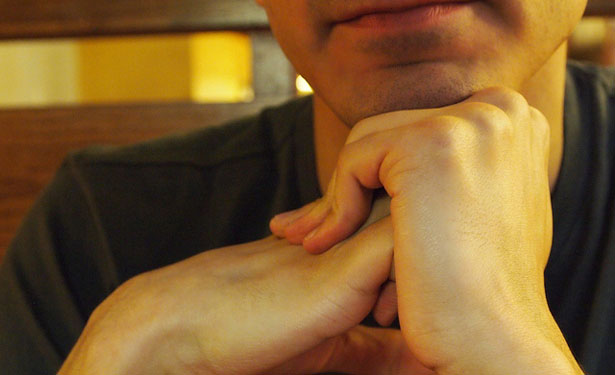Cracking Your Knuckles Can Give You Arthritis: Science or Myth?
Research shows no link between the compulsive habit and the painful joint condition.

Obsessive knuckle-crackers are probably familiar with the old warning: keep up the noisy habit, and you'll get arthritis someday. If you're like most, though, the thought of aching joints hasn't stopped you from cracking away, however guiltily.
Can cracking your joints really give you chronic osteoarthritis? Or is it just a myth?
Turns out all that finger-wagging isn't what it's cracked up to be (sorry) -- although there's plenty of speculation about how one could fall victim to the condition. It's sometimes said that the amount of force people apply to their knuckles could strain tendons. Others have noted that the mechanism behind the cracking noise -- brought on by a rapid collapse of gaseous bubbles in between your joints into lots of smaller bubbles -- isn't unlike the cavitation that puts wear and tear on ship propellers.
Fed up with being told by family members about the dangers of joint cracking, one researcher decided to test the supposed link between arthritis and knuckle-cracking -- on himself:
For 50 years, the author cracked the knuckles of his left hand at least twice a day, leaving those on the right as a control. Thus, the knuckles on the left were cracked at least 36,500 times, while those on the right cracked rarely and spontaneously.
The scientist proudly reported that his relatives were spreading crackpot (ugh, sorry) theories in a paper published in 1998. The "research" won him an Ig Nobel Prize.
Okay, but how about some real science? Studies of knuckle-cracking began in the early 1970s. Some of their methods were a little dubious, to say the least. One of the first papers to be published saw one scientist approach 28 seniors in a Jewish retirement home to see if they could remember cracking their knuckles when they were younger (if they did, they were asked to prove that they could still "demonstrate a KC [knuckle-cracking] maneuver"). In an effort to assess the impact of knuckle-cracking over time, the researcher also surveyed 28 children. Despite the study's strange approach, it concluded that "the chief morbid consequence of knuckle cracking would appear to be its annoying effect on the observer."
Since then, the science has gotten markedly better. A 1990 study surveyed 300 hospital patients, 74 of whom admitted to habitual knuckle-cracking over anywhere from 18 to 60 years. In comparison to non-knuckle crackers, the habitual crackers didn't seem to suffer from arthritis at greater rates, though they did show weaker grip strength and more hand swelling. The authors chalked that up to the fact that those who cracked their knuckles generally did more manual labor.
But it's only recently that we've seen compelling research on knuckle-cracking. Last year, a team of Defense Department-funded researchers took a look at patients who'd had hand X-rays within the past five years. Those whose scans confirmed the presence of arthritis got sorted into one group, and those without arthritis got put in another. When each group was asked about knuckle-cracking habits, it actually turned out that those who didn't crack their knuckles had slightly greater rates of arthritis (18.1 percent versus 21.5 percent). Other interesting results: women were found to crack their knuckles less often than men. And the most commonly cracked joints? The proximal IP joint (the knuckle in the middle of your finger that lets you bend it in half), followed by the MCP joint (the knuckle that connects your finger to your palm).
The researchers concluded that having a history of knuckle-cracking had no correlation with osteoarthritis -- even after accounting for people's cumulative exposure to the habit.
So, compulsive joint-manipulators, rest easy: the only cracks you need worry about now are the ones you step on.
...I'll show myself out.